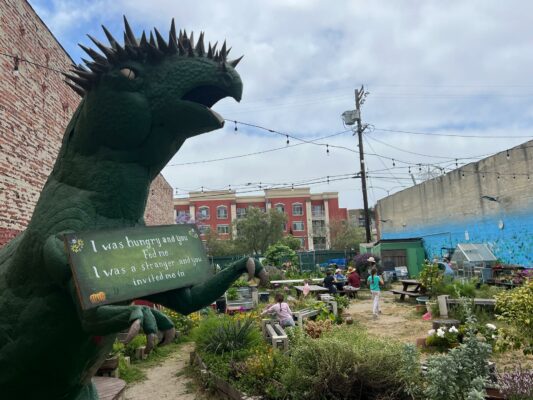
Redondo Beach harbor director Richard Parsons called Les Guthrie “a master of confusion.”
City attorney Jerry Goddard, who ensnared the pioneering King Harbor Marina lessee in endless litigation, said, “Les Guthrie is a shark. If this was 100 years ago, he’d probably be a robber baron.”
City manager Bill Kirchoff said of Guthrie, “He was difficult to work with, a tough negotiator. But he is an entrepreneur with extraordinary vision. He deals honestly, his word is good and he is trustworthy. He was generally about two steps ahead of everybody else. And he has the rare ability to think strategically in terms of the changing economic environment.”
Portofino Marina developer Mary Davis said of her fellow master lessee, “He’s a tough customer, brilliant. He fought hard to get his way. And even though he was sometimes wrong, he should have gotten more respect from the city than he did.
Steve Shoemaker, now the last of the original King Harbor lessees, who lost part of his leasehold in a dispute with the city, described Guthrie as “a very astute businessman. Certainly, the harbor would not be what it is today without him. No one sued, or was sued by the city more than he was, not even me.”
Guthrie was that rare combination of visionary and micromanager. One colleague described him as a “spreadsheet king.”
Architectural designer Todd Vander Pluym recalled Guthrie asking him to design a six-story, senior citizens condominium complex for the marina, with a monorail running through it: “I didn’t know if it was a put-on or not. I told him nobody was going to go for it. Les really hated people telling him something couldn’t be done.”
It is possible Guthrie himself didn’t know if the monorail seniors complex was a commercial project or a creative exercise.
“A sculptor needs clay. I need sticks and stones, steel and concrete to express myself. There’s a certain creative process there, a certain feel. When you stifle a person’s creativity, it’s like killing that person,” he said in a 1983 Easy Reader interview.
Guthrie would suffer countless near deaths, professionally, some man-made, such as city attorney Goddard’s refusal to issue Guthrie a certificate of lease compliance required by his bank for his King Harbor apartments, until Guthrie prevailed in a costly lawsuit; natural disasters also nearly prevailed, including the 1994 earthquake that destroyed a seawall protecting his marina. Again, litigation was required to force the city to honor its partnership responsibility to repair the 200 boat slips he lost.
Guthrie waged an equally contentious fight for over two decades against Waldenström’s Macroglobulinemia, a rare blood disease, which forced him to give up skiing at age 79, and at 80 to end his 27-year year running streak in the Redondo Beach Super Bowl Sunday 10K, which he founded in 1978 to encourage visitors to the harbor.
The disease finally claimed its inevitable victory. Guthrie died Saturday at Cedar Sinai Hospital, at age 84.

Young and restless
Guthrie arrived in Redondo Beach with his Harrison Ford looks and swagger in 1968 to build the Harbor Cove apartments and Charthouse, and developed a godfather-like presence as master lessee of King Harbor, one of the Redondo harbor’s four marinas. His King Harbor Marina holdings included 850 boat slips, 49 apartments, 18 office units, the Spectrum Athletic Club, the Blue Water Grill and the King Harbor and Redondo Beach yacht clubs.
Guthrie was born October 21, 1926 in Los Angeles. The only child was nicknamed Buddy and helped support his single mother by selling magazines door to door and delivering the Los Angeles Examiner newspaper.
At 17, he entered the Navy and at 22 earned his general contractor’s license. The cover story of a 1951 Los Angeles Times Home Magazine features a Mulholland Drive home he designed and built. A 60-foot-wide, laminated plywood arch supported the living room that floats off the edge of the cliff.
By the early 1960s, Guthrie was a Manhattan Beach resident and a well-connected investor and developer with successes in massive projects in Aspen, Colo., and Thousand Oaks. That’s when he got involved in the land-side development of what was then the new boat basins forming King Harbor, named after Congressman Cecil King. After building the Harbor Cove Apartments and the enormously popular Chart House Restaurant, he paid $50,000 — money he got by mortgaging his house — to take over the King Harbor Marina. He gathered 18 participating financial partners and they set out to create a dream.

The going was not easy.
“The [harbor construction] revenue bonds [owned by the city of Redondo Beach] were in default, the market wasn’t that strong at the time, the amount of potential profit that came off the purchase wasn’t as great as I thought it was going to be,” recalled Guthrie in a 2007 Easy Reader interview, on the occasion of his 80th birthday. “And having, at that time, five small children, it was very difficult to get enough revenue to even pay living expenses. We were in kind of a leaky rowboat. But there was cooperation with the city. Francis Hopkins was probably the best city manager we ever had. That was a true public-private partnership, as a partnership should be, where both partners have concern about the other, where both have mutual interests.”
In 1987 Guthrie was named Redondo Beach Man of the Year.
In 1989, he bought out his business partners to assume complete control of King Harbor Marina leasehold.
“In any partnership there are disagreements,” he said of his early relationship with the city. “But we always were able to work these out. All the discussions were at ‘eye-level’ between people who came into a room, said we have a problem, and asked what can be done to work it out.”
“Now, when you have a problem (with the city) you look up at a dais with five or six people sitting there looking down on you, and a lot of people behind your back taking snipes at you.”
The divorced Guthrie married Maryann Carroll in 1985. She had been managing Guthrie’s King Harbor SportsCenter health club when she got a better offer from the South Bay Hospital District.
That’s when the pair started dating. When Les asked her to marry him, she told him, “this is going to cost you a lot more than that raise would have.”
Guthrie disagreed.
“Marrying her was the smartest thing I ever did,” Guthrie said.
Sean Guthrie, following his father’s passing, recalled that one of his dad favorite sayings was, “A man’s reach should exceed his grasp, or what is a heaven for.”
Guthrie is survived by his wife Maryann, former wife Capitola, son Sean, daughters Gerel Santiago, Danelle Guthrie-Buresh, Deslie Burt and Tera Guthrie; and six grandchildren.
His family plans a private celebration of his life, and asks that donations be made to Richstone Family Center, 13620 Cordary Ave., Hawthorne, CA 90250.









